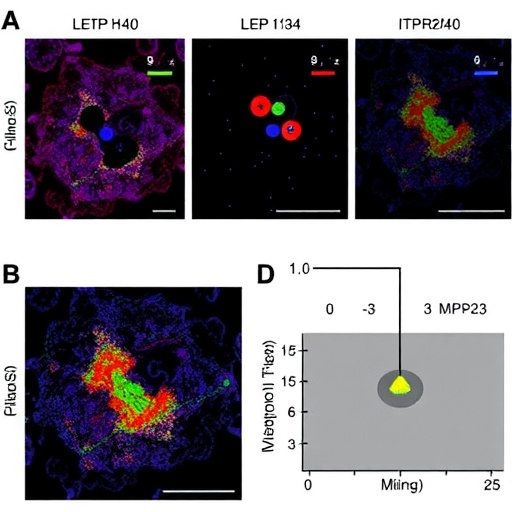In a groundbreaking study, researchers conducted significant investigations into the mechanisms underlying the pathophysiology of methionine-choline deficiency (MCD)-induced metabolic syndrome and its association with macrophage pyroptosis. This work sheds light on the implications of mitochondrial DNA (mtDNA) release in cellular responses to metabolic stress, unveiling novel therapeutic targets that may alter the future of treatments addressing metabolic disorders and inflammation.
The authors of the study, including Zhang, Q. and colleagues, examined how mitochondrial dysfunction is intimately linked with the onset of metabolic conditions. Specifically, they explored the processes triggered by 1-methyl-4-phenyl-1,2,3,6-tetrahydropyridine (MPTP), a neurotoxin that induces mitochondrial malfunction, thereby leading to oxidative stress. This oxidative stress is pivotal, given its role in the activation of a variety of inflammatory pathways, and the researchers aimed to elucidate the connection between oxidative stress, mitochondrial dysfunction, and inflammation.
The release of oxidatively damaged mitochondrial DNA (Ox-mtDNA) into the cytosol acts as a signal that can provoke an intense inflammatory response. Once released, Ox-mtDNA was found to trigger pyroptosis, a form of programmed cell death that is associated with inflammation, particularly within macrophages. Pyroptosis leads to the release of pro-inflammatory cytokines, creating a cascade that exacerbates tissue damage and inflammation, which is particularly detrimental during metabolic disturbances.
A focal point of Zhang et al.’s study was the ITPR3 (inositol 1,4,5-trisphosphate receptor type 3) signaling pathway. They elucidated how this receptor plays a crucial role in managing calcium homeostasis within cells, an essential process that mediates cellular responses to stress. The increase in intracellular calcium levels is profound, as it serves not only as a secondary messenger but also as a key driver of the NLRP3 inflammasome activation, further contributing to the inflammatory milieu.
Engaging with the NLRP3 inflammasome—an essential component of the innate immune system—the study demonstrated that the activation of this multiprotein complex leads to caspase-1 activation, ultimately culminating in the maturation and secretion of interleukin-1β (IL-1β), one of the most major pro-inflammatory cytokines. This finding highlights the interconnectedness of mitochondrial dysfunction, calcium signaling, and the inflammatory response, linking oxidative stress to more systemic effects observed in metabolic syndrome.
Moreover, the implications of the study regarding metabolic dysfunction are profound. Through the lens of evidence presented by Zhang and colleagues, it has become evident that the failure to adequately manage oxidative stress can have cascading effects, harming not only localized tissues but also leading to systemic metabolic dysfunction. Given that MCD is a model for studying aspects of non-alcoholic fatty liver disease (NAFLD) and its progression to more severe hepatic conditions, the findings provide a deeper understanding of how inflammatory responses can exacerbate such diseases.
In the context of therapeutic strategies, the research paves the way for innovative approaches to mitigate the detrimental effects of oxidative stress on mitochondrial function and inflammation. Potential pharmacological interventions could focus on stabilizing mtDNA release or modulating calcium signaling to temper inflammatory responses effectively. Such strategies could revolutionize how conditions associated with metabolic syndrome and inflammation are approached in clinical practice.
The overall evidence provided by the research underscores an emerging narrative in metabolic disease—where mitochondrial health, oxidative stress, and inflammation are inextricably linked. As the scientific community continues to explore these pathways, future research is necessary to develop targeted treatments that harness these insights, striving to improve patient outcomes in metabolic disorders.
Zhang et al.’s results reflect a critical advancement in our understanding of the cell’s response to metabolic dysregulation. By unraveling the interplay between mitochondrial function, Calcium-mediated signaling, and inflammation, they have opened new avenues for potential interventions that may interrupt this vicious cycle. Such a holistic examination of the involved pathways indicates that future strategies could expand beyond traditional anti-inflammatory approaches, possibly incorporating mitochondrial-targeting therapies.
As ongoing studies further clarify these mechanisms, a clearer perspective on how to manipulate these pathways could emerge, guiding researchers toward novel, efficacious therapies for conditions like metabolic syndrome, obesity, and fatty liver disease. It is essential to continue this line of inquiry, as the implications of mitochondrial dynamics and inflamed states can affect broader dimensions of metabolic health, especially given the global rise of related health conditions.
In summary, Zhang and colleagues have significantly advanced our comprehension of how oxidative stress and mitochondrial health contribute to inflammatory responses within the context of metabolic disturbances. Their findings promise to inform future research directions and therapeutic strategies, holding the potential to reshape clinical approaches to metabolic disorders. The journey from understanding these fundamental pathways to the application in clinical settings is a frontier that presents numerous opportunities for innovation and improvement in health outcomes.
Subject of Research: Mitochondrial dysfunction and oxidative stress in metabolic disorders.
Article Title: MPTP mediated Ox-mtDNA release inducing macrophage pyroptosis and exacerbating MCD-induced MASH via promoting the ITPR3/Ca2+/NLRP3 pathway.
Article References: Zhang, Q., Chen, L., Liu, JY. et al. MPTP mediated Ox-mtDNA release inducing macrophage pyroptosis and exacerbating MCD-induced MASH via promoting the ITPR3/Ca2+/NLRP3 pathway. J Transl Med 23, 1289 (2025). https://doi.org/10.1186/s12967-025-07302-8
Image Credits: AI Generated
DOI: https://doi.org/10.1186/s12967-025-07302-8
Keywords: Mitochondrial dysfunction, oxidative stress, inflammatory response, metabolic syndrome, macrophage pyroptosis, ITPR3 pathway, NLRP3 inflammasome.




